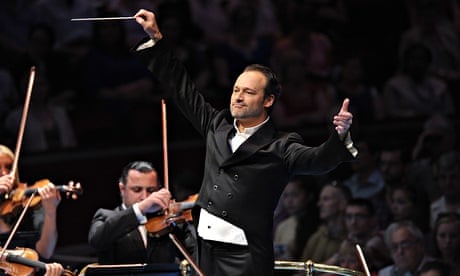Founded in 1999, the Borusan Istanbul Philharmonic is the second orchestra to make its Proms debut as part of this year's "global visitors" series, and the impact it made with its flamboyant principal conductor, Sascha Goetzel, was tremendous. The bulk of the programme consisted of western European works inspired by the Middle East, some of them over-the-top, some teetering uncomfortably on the edge of orientalism. But they're a classy, enthusiastic ensemble, and Goetzel is the consummate showman.
The programme allowed them to display their technical security over a wide stylistic range. Mozart's overture to Die Entführung aus dem Serail whirred dexterously, while Handel's Arrival of the Queen of Sheba, which they played without Goetzel, was all lightness and grace. A group of works from the 19th and early 20th centuries, meanwhile, showcased Goetzel's fine sense of orchestral colour and the virtuosity of the BIPO's playing.
Respighi's 1932 ballet Belkis, Queen of Sheba, fancifully depicting the lady's sexual encounter with Solomon, was engulfing in its opulence. There was also a reappraisal of Holst's neglected Beni Mora, partly inspired by the composer's travels in Algeria, and partly by Robert Hichens's 1904 potboiler The Garden of Allah. Its refined, if frank sensuality offended sensibilities at its 1912 premiere, but now strikes us as intoxicating.
One work, however, stood apart. Daniel Hope was the soloist in the world premiere of Gabriel Prokofiev's Violin Concerto No 1 "1914" – an ambitious depiction of Europe's descent into war. It contained some startling effects. The BIPO sounded good in it, and Hope impressed by playing atrociously difficult music from memory. But Prokofiev has a habit of hanging on to individual ideas for too long, and some of it felt too discursive for comfort.

Comments (…)
Sign in or create your Guardian account to join the discussion